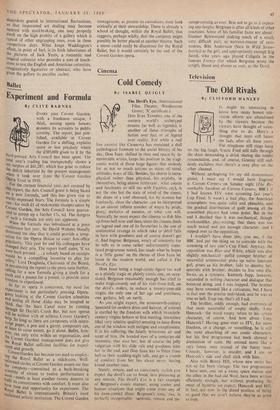Cinema
Cold Comedy
By ISABEL QUIGI,Y
Grove; 'X certificate.) • DON JUAN TENORIO, one of the western world's archetypal dreams (as Well as legends), is another of those triumphs of fiction over fact or of legend over reality. For while a real live .amorist like .Casanova has remained a. dull pathological footnote to the social history of his day, Don Juan, shifted in time and space by in- nomerable artists, keeps his position in the tragi- comic world of those. large figures that embody for us not so much actions as states of mind, attitudes, ways of life. Besides, his charm is-meta- physical rather than • physical, his exploits, in themselves, being almost irrelevant: What counts and fascinates us -still '.(as with Faustus, .say), is not the sins but the state of mind of the sinner, the shape of a soul obsessed, not by women but (Variously, since the character can be interpreted in an almost infinite number of ways) by pride, glory, statistics of success, or what you will. Naturally he must expect the :cinema to fish him up from hell now and then, since the cinema feeds - on legend and one of its favourites is the one of sentiMental revenge in which rake or devil- falls in love with goodness and of course doesn't get it. And Ingmar•Bergman, weary of solemnity (so he tells us in some rather Unfortunately trans- lated programme notes), has made what he hopes is a little game' on the theme of Don Juan let loose in the modern world, and called it The Devil's Eye.- . Don Juan being- a tragi-comic,' figure (as well as a plainly tragic or plainly comic One, on occa- sions), .Bergman -reasonably enough has tried to make tragicomedy out of his visit from hell, on the devil's orders, to seduce a twenty-year-old virgin, the only one of her age and prettiness, one gathers, left on earth.
As you. might expect, the seventeenth-century Spaniard (in modern dress and haircut, of course) is startled by the freedom with which twentieth- century virgins behave at first meeting, innocence (that very relative quality) seeming to have flown out of the .window with intrigue and compliments. It is his suffering, the faintly brimstone air and scent of him, the hooded eyes of a centuries-old insomnia, that woo her; but of course the jolly vulgarian with his slide rule and 'goodness wins her in the end, and Don Juan has to listen from hell to their wedding-night talk, and get a crumb of comfort from her lies about never, having kissed another man.
Stately, ornate, and so consciously stylish you expect the devil's cat to break into plainsong at any minute, The Devil's Eye is a fair example of Bergman's comic manner, using scenes and human situations that might coin° from • any of his (non-comic) films; Bergman's lone, • too, is perfectly recognisable-- sardonic, remote and un-
compromising as ever. Best not to go to it expect- ing any laughs; Bergman is after all kinds of other reactions. Some of his familiar faces are about: Gunner Bjornstrand making much of a small, very difficult part, as narrator-master of cere- monies, Bibi Andersson (Sara in Wild Straw- berries) as the girl, and appropriately enough Stig Jarrel, who years ago played Caligula in the famous Frenzy (for which Bergman wrote the script), bland and plump as ever, as the Devil.






























 Previous page
Previous page